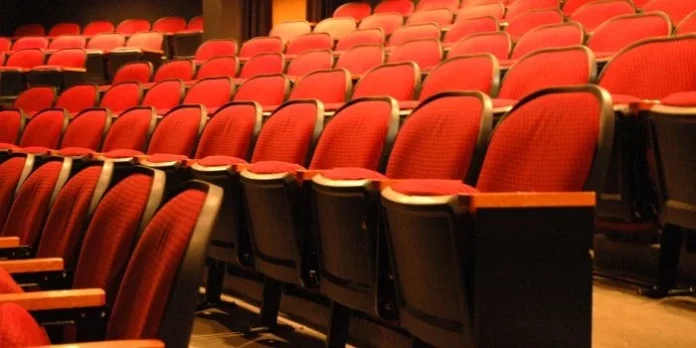To begin at the end, as Dylan Thomas would not say: Hannah Moscovitch’s Infinity comes full circle to conclude that time exists. It is real. It is not a construct, despite the various calendars created by different cultures, religions and civilizations.
Nothing revolutionary about that, you might say. But the play’s journey to reach this conclusion is one of infinite delight. Infinity – or, as Moscovitch says, “put in theologian terms, Eternity” – cannot be defined by theoretical physics, although her play of the same name does a brilliant job in its attempt to do so.
Moscovitch’s work is divinely constructed, creatively directed and beautifully executed by members of Toronto-based experimental theatre company, Volcano. Their policy is to keep productions alive by re-mounting and touring them. As a happy result, Vancouverites can catch this absorbing, charmingly funny and often moving experience.
Teresa Przybylski’s simple but effective set is comprised mainly of a horizontally striped scrim that provides both backdrop and front cloth for three accomplished actors and one equally accomplished violinist to inhabit for 90 minutes. A series of pedestrian props and pieces of furniture adapt easily to suit the tick-tocking action.
The play opens with the appearance of the sole, silent figure of violinist Andréa Tyniec. Once she establishes her dramatic presence, she applies bow to nineteenth-century violin and brings to life the original music of fellow Canadian, Njo Kong Kie. Then she leads the audience’s attention behind the scrim where her ghost-like presence and Njo Kong’s music punctuate emotional changes and nuances as the story unfolds.
‘Unfolds’ is perhaps a misnomer. The play strides, strikes, strokes, strips, trips and twists to carry its audience on a ride that ends where it begins. Like infinity. It is ingeniously moulded by Volcano’s founding artistic director, Ross Manson, who approached Moscovitch to write the play after reading an article about the history of timekeeping in Harper Magazine several years ago.
Manson says he became intrigued by time, and how we humans, caught inside something so much bigger than ourselves, contend with it.
Some time later, Moscovitch met theoretical physicist Lee Smolin, who inspired and guided her. Simon went as far as to write a detailed biography for the lead character, theoretical physicist Elliot, who is engrossed in his Ph.D. thesis on time and string theories. Manson worked with award-winning Amy Rutherford and several other skilled actors, alongside Njo Kong, Tyniec and choreographer Kate Alton to create the original production.
Rutherford and Tyniec still perform in the current production, now on stage at The Cultch. They are joined by theatrical veteran Jonathan Young, core actor and co-founder of Electric Company Theatre, who plays Elliot, and relative newcomer Emily Jane King, who plays his daughter. The ensemble’s work, enhanced by an exceptional crew of designers and backstage personnel, is precise, fast-paced and profound.
The whole is a dance through time. At one point, Alton choreographs a living montage of the three actors’ movements and emotions, depicting the passage of time in terms of years, during which Elliot and his family struggle to fulfill their individual needs. Like any other family.
In the final analysis, despite everyone’s faults and failings, Infinity is really a play about love; how it glues us together, no matter the influences, pressures and disappointments time throws our way. It’s a play well worth seeing.
Infinity by Hannah Moscovitch. Directed by Ross Manson. A Volcano Theatre production presented by The Cultch. On stage at The Cultch’s Historic Theatre (1895 Venables St. Vancouver) until January 19. Visit thecultch.com for tickets and information.

